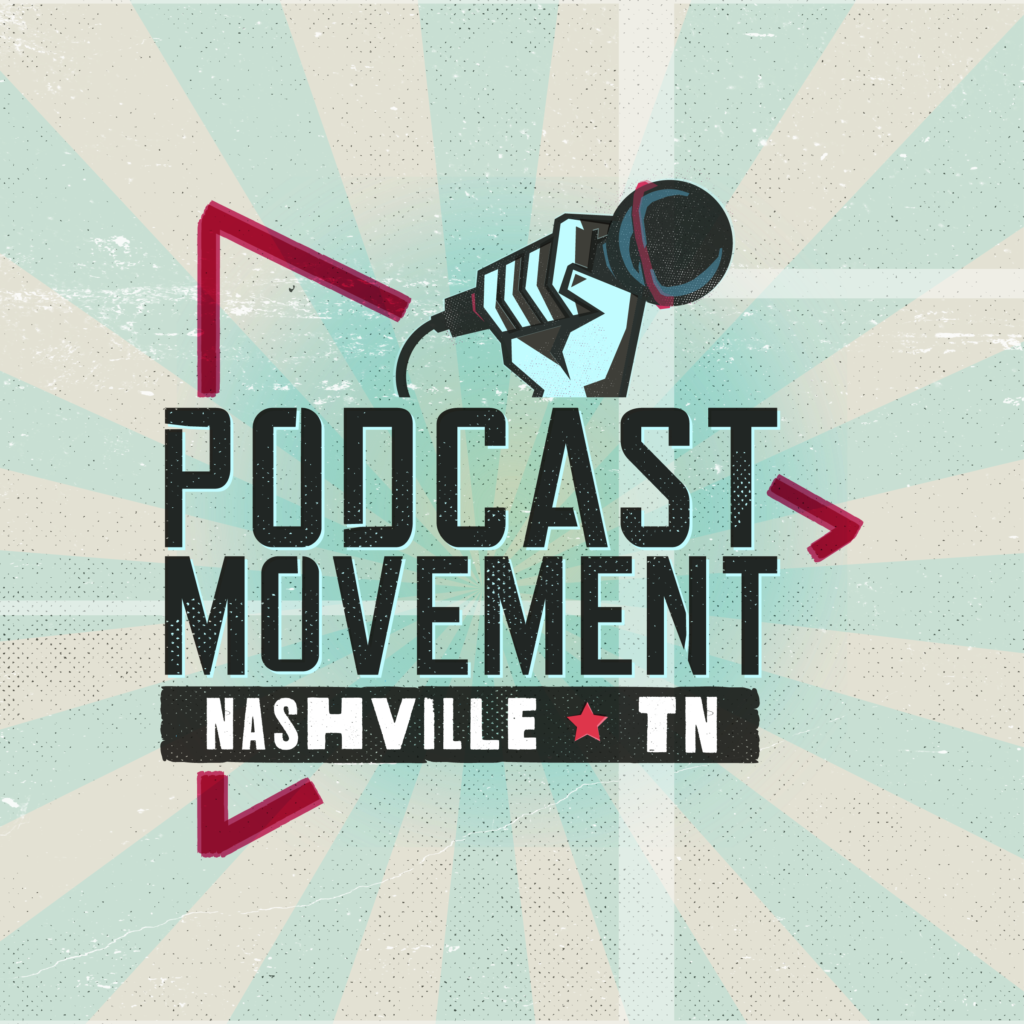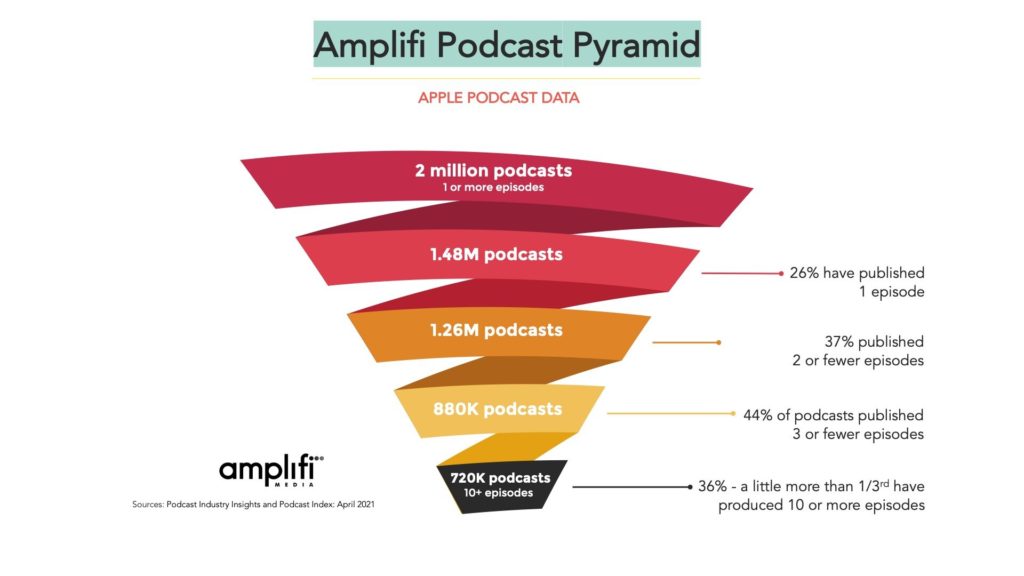
Riddle me this: Every time I write a blog post about the state and trajectory of radio (which is often), the comments pour in from all quarters, reminding me that consolidation is the culprit – or catalyst – that started the chain reaction that’s gotten us to the pitiful point we are in now.
And here we are, barely out of the first quarter of a new year, and observers are already declaring 2021 as the year when consolidation in podcasting took root. At the rate of speed at which we’re going, the industry will be well on the way to being sorted out by the time podcasters and their teams of agents and lawyers meet in Nashville this August at Podcast Movement.
in Nashville this August at Podcast Movement.
It seems like not a week goes by without a big, bombastic announcement about podcasting – especially in the mergers and acquisitions department – going down. And not just by former radio broadcasting companies jockeying for position, but by the likes of Apple, Google, Facebook, Amazon, and Spotify ensuring their eminence in this gold rush.
If that sounds like the 80:20 Rule taking shape in the world of podcasting, you’re on the right track. But your numbers may be off a bit.
In a comment to Seth Resler on his great post early this week – “What Radio Broadcasters Need to Know About Facebook and Apple’s Podcasting Announcements” – Minnesota Public Radio’s Tim Roesler did some back of the napkin math and reached this conclusion about the victors and the spoils:
“It’ll be 95/5. Five percent of podcasters will be take 95% of the subscription money. My 2 cents, your mileage may vary.”
Hopefully for the hundreds of thousands of fledgling podcasters, Roesler’s 95% isn’t low. When you look closer at Steve Goldstein’s recent analysis of how many truly viable podcasts exist in the ecosystem, Mr. Darwin’s theory is already proving out. Podcasters have been weeding themselves out, thanks to mediocre content, faulty business plans, and a marketplace that makes it highly challenging to have a breakout hit.
Steve’s upside-down pyramid is a great use of data visualization that shows us just how virulent “pod fade” is – giving up on a podcast after just a handful of episodes.

Your odds of success might be better trying to get a TikTok video to go viral. Or publishing a newsletter, and attracting enough subscribers to make it sustainable. Or even buying a radio station in a small market and turning a profit.
Thanks to what The New York Times refers to as “rapid consolidation,” we’re seeing announcement after announcement from some of the biggest players in media and technology line up their strategies.
Consider that in just the past few days, the following deals and initiatives have been hammered out or launched:
- Facebook has launched an in-line audio player in partnership with Spotify.
- Apple debuted Podcast Subscriptions, a new program that starts this weekend enabling podcasters to monetize their shows (with Apple taking its usual 30% cut).
- Spotify has launched its own podcast subscription model via their recent purchase of Anchor (read the fine print: no fee until 2023 and then the “cut” begins at 5%).
As the saying goes, “When the elephants dance, it’s the ants that get trampled.”
And there’s no question the pachyderms are prancing.
That leads us to the announcement earlier this week the seminal podcast pioneer, Roman Mars, was selling his franchise to SiriusXM, specifically their recently purchased Stitcher division.
Mars’ claim to fame is the critically acclaimed podcast 99% Invisible, spawning a radio feature on NPR, a book, and a host of other podcasts.
In an interview with The New York Times earlier this week, Mars expressed both his relief and his disdain for where the podcasting landscape is heading:
“What does it mean that Facebook is getting into audio? Or that Apple is changing the ‘subscribe’ button to a ‘follow’ button? I don’t know and I don’t want to figure it out. I feel at sea in this business in a way that I haven’t up to this point. Everyone is trying to crack this question of how to get people to pay for premium audio.”
it out. I feel at sea in this business in a way that I haven’t up to this point. Everyone is trying to crack this question of how to get people to pay for premium audio.”
When an icon like Roman Mars tires of the almost daily machinations, trying to determine where the industry is headed as the elephants dance, what does it say about the ants?
Mars also unloaded in the interview he is tired of the “administrative duties” that come with running a small, independent company.
But it is his last words in the Times story that ring both prophetic and perhaps pathetic:
“With a bigger company (SiriusXM), I can do more things and not be fettered by the small business mentality. Hustle less and make more.”
From ant to elephant maybe.
Welcome to the jungle.
Seth Resler and I will be presenting at Podcast Movement this year. Details here.
And sign up for our free Techsurvey 2021 webinar on May 6 at 2pm ET. Among other things, new podcasting data will be presented you haven’t seen. Register here.
- What Is It With Female Robot DJs? - April 30, 2025
- Why “Dance With Those Who Brung You” Should Be Radio’s Operating Philosophy In 2025 - April 29, 2025
- The Exponential Value of Nurturing Radio Superfans - April 28, 2025




Is podcasting the “selfie” of radio? We got into broadcasting to provide mass service. Consider taking advantage of the new opportunity to maximize license value with superior content & connection. Thank you, Fred.
When you consider that six in ten core radio listeners hardly/never listen to podcasts, it makes you wonder. (That’s according to TS 2021.)
The good news for the “ants” is most of the “elephants” are still dancing to the old tune “It’s a Mass Appeal World.”
The more things change, the more they stay the same.
Déjà vu all over again, right?